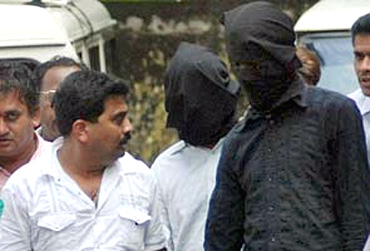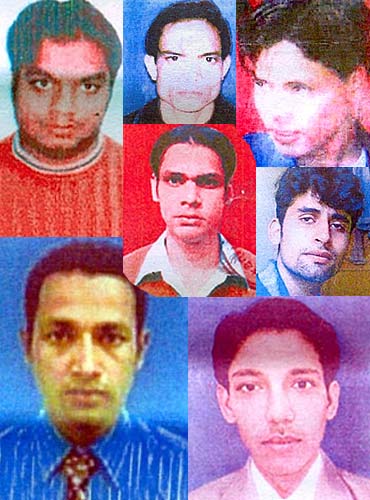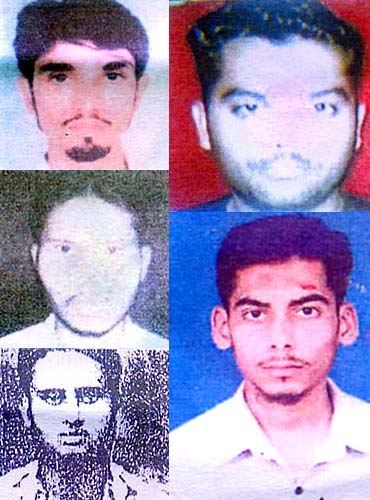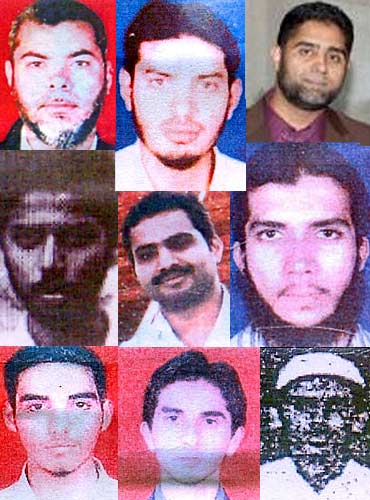 | « Back to article | Print this article |
From SIMI to IM, there was more than a name change
Investigators are still cautious about naming any particular organisation behind the July 13, 2011, Mumbai serial blasts. But behind the scenes, the direction of the investigation is fast moving towards the possible involvement of the recently declared terrorist organization, Indian Mujahideen. Toral Varia takes you through some of the faces behind this terror outfit
Periodically the home ministry updates the list of wanted Indian Mujahideen suspects from the above-mentioned states. Rediff.com has accessed one such list prepared a few months ago which chronicles 31 operatives of the Indian Mujahideen. Before that, a little bit of history about the organisation that has interested Indian investigators.
On August 16, 2008, Ahmedabad's joint commissioner of crime Ashish Bhatia had first described the Indian Mujahideen as an offshoot of the older Student's Islamic Movement of India, commonly known as SIMI, a banned outfit. While giving details on the arrest of IM operatives in connection with the 2008 Ahmedabad serial bombings, Bhatia had explained that the initials IM have also been derived from SIMI, by dropping the first and the last initials. That was the first time the media was officially informed about a new home-grown terror outfit. Today, of course, the Indian Mujahideen is synonymous with terrorism.
Shirshir Gupta of the Indian Express, in his book Indian Mujahideen, the enemy within, records that it was a meeting on April 25, 2007, in Hubli, Karnataka which was originally meant to iron out differences within SIMI, that became the grounds for the formation of a new outfit which much later came to be known as the Indian Mujahideen. To quote an extract from his book:
The main idea of the meeting was to smoothe out differences within the organisation as many leaders were advocating radical action and wanted to move beyond just rabid speeches and slogans. This meeting was attended by PA Shahduli and his brother Shibli Peedical, Mohammed Hafiz, Ansar Maulvi, Mohammed Yasin, Ahmed Baid, Shakeel Ahmed, Kamruddin Nagori, Shahbaz Hussain, Yahya Kamakutty, Abduss Subhan and Mohammed Ali. Yet again the discussion fervently centered on punishing those who had brought down the Babri Masjid and it was decided to target them while consolidating the SIMI core ideology. However, certain key decisions were also taken in this meeting. They were:
- Shahbaz Hussain was elected amir (chief) of the proscribed group.
- Group's name was changed to Islamic Movement by dropping 'Students' and 'India'.
- The maximum age limit of 30 years was removed and membership was open to all.
- The rule of suspending ansars when they went abroad was abolished.
- The Islamic Movement would not align itself with any political group.
The central committee with Safdar Nagori was scrapped and three separate committees, headed by Kamruddin Nagori, Shibli Peedical and Adnan respectively, were set up to assist Shahbaz.
Shibli was given charge of Maharashtra and Uttar Pradesh, Hafiz was asked to handle southern India and Kamruddin Nagori was asked to oversee the training of ikhwans as well as handle the Madhya Pradesh operations.
Abdus Subhan was asked to liaise with various ulemas in the country in order to garner support for action against Hindu groups.
IM is divided into three main modules
Sources in the India's intelligence set-up told rediff.com that the Bhatkal brothers have moved base from Pakistan to the Middle East. This explains why in the latest 'Most Wanted' list that was handed over Pakistan, there was no mention of the brothers.
The Bhatkal brothers, along with Amir Raza, co-ordinate and activate the Northern, Western and Southern modules of Indian Mujahideen on a need-to-know basis. The northern group of the Indian Mujahideen comprises recruits from Uttar Pradesh, Delhi and Jharkhand; recruits from Maharashtra and Gujarat form the Western India module; and recruits largely from Kerala and Karnataka form the Southern India module.
Ariz Khan alias Junaid, Mirza Shadab Baig, Mohd Sajid, Mhd Khalid, Dr Shahnawaz Alam, Asadullah Akhtar, Abu Rashid and Sharfuddin are the eight operatives from Azamgarh in Uttar Pradesh.
IM's module from the west
India's 'most wanted,' next only to Dawood Ibrahim, are the infamous Shahbandri brothers also known as the Bhatkal brothers from Karnataka Riyaz and Iqbal -- followed by Ahmed Yasin, Mudassir Yasin, Mohammed Hussain Farhan, Maulana Sultan Shah, Azam, Jasim, Samir Salim Khan, and Wasim. Most of the 10 absconding IM operatives are residents of Bhatkal in Karnataka and close aides of the Shahbandri brothers.
Mujeeb and Alamzeb Afridi are the two operatives on top of Gujarat's most wanted list. With as many as 66 operatives now in custody, Gujarat has seen the maximum crackdown on Indian Mujahideen suspects. The latest to be arrested by the Gujarat police was Danish Riyaz, a resident of Jharkhand, who was one of the two operatives on the wanted listed. Danish's associate Manzar Imamuddin Khan is still absconding.
IM's southside story
Much like those already in custody, these wanted IM operatives are also reported to have imbibed extensive religious education from madrasas.
Shahbandri alias Bhatkal brothers
According to the dossier with the intelligence agencies, it was shortly after his induction in SIMI that Riyaz Shahbandri met his Indian Mujahideen co-founders, Abdus Subhan Usman Qureshi and Sadiq Israr Sheikh (currently in the custody of the Gujarat police).
Some time in 2004, Riyaz got connected to ganglord turn jihadist Amir Raza. In collaboration with Raza, who was then in Pakistan, Riyaz started recruiting and funneling recruits for training across the border.
Later in 2004, Iqbal Bhatkal, on the instructions of his brother Riyaz, started conducting ideological classes with help of a local cleric. The group also actively started training themselves in shooting and basic combat. Before fleeing from the country some time in 2007, the Shahbandri brothers established Bhatkal, near Mangalore as their base and set up operational safe-houses there.


